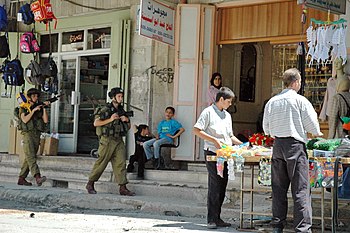 |
| Boycott Israel-poster (Photo credit: Creap) |
 |
| Palestine Cemetery (Photo credit: NatalieMaynor) |
 |
| Open-air market in city being patrolled by Israeli troops (2004). (Photo credit: Wikipedia) |
 |
| English: Juliano Mer Khamis, executed head of Jenin theatre school (Photo credit: Wikipedia) |
Talk about sad! And depressing! I had scarcely stopped reflecting on the sad spectacle I wrote about yesterday of watching a former Israeli foreign minister, who seemed to be a reasonable and decent man, painfully trying to reconcile the Zionism of which he said he is an “ardent” defender, with the liberal political principles he also espouses, before I was again plunged into the maelstrom of the Israeli-Palestinian imbroglio, thanks to a screening last night of an excellent film called Fragments of Palestine by Cinema Politica Concordia.
Ezra Winton, who moderated the screening, said in introduction that they tried to screen a film every year about Palestine, and this one was slightly more hopeful than the earlier ones.
If this is hopeful, I am a drunk monkey. Of course, if you are a glass-half-full kind of guy, there were some hopeful things to be taken out of the film. But the previous night I had heard Avi Shlaim, an Oxford historian who once served in the Israeli Defence Force, memorably describe the present Israeli Prime Minister as a man who is negotiating the division of a pizza but who keeps eating it. And this film is about what is happening on the ground while this farcical negotiation is proceeding as it has done for decades, and Netanyahu keeps eating the land without anyone in the international community --- read, especially the United States --- ever trying to stop him in mid-bite, as it were.
Even the former Foreign Minister, Shlomo Ben Ami, had to admit that the state of Israel, which still claims to be a democracy within its original borders, lost its international credibility after the 1967 war when “it became a colonial power ruling over a captive population.”
This is the elephant in the room in all discussions about Israel and its neighbours, and last night’s film, beautifully shot and edited by a young German woman named Marie Caspari and her crew, is a detailed description of this colonial situation (to use the word used by Ben Ami).
The
film is based mostly on a small town of 1800 inhabitants on the West Bank,
Bil’in. It tells the story of three people either directly or peripherally
engaged in the countless demonstrations of resident protest against the Israeli separation wall, which ran
through Bil’in’s lands, and against the route of which the residents won court
victories first at the International Court of Justice, and then at the Israeli
Supreme Court. In this latter judgment, the Israeli government was ordered to
move the wall off the Bil’in lands --- a judgment made in 2007, but not
executed until 2011. Ms. Caspari’s film was made during that interregnum.
She
tells her story through three interlocutors, each of whom has a story of great
interest. One, whom she came across by accident, is an 18-year-old English boy,
Jody McIntyre, who is wheelchair-bound with multiple sclerosis, but who has come to Bil’in
with the intention of helping the villagers in their struggle for justice from the
Israeli occupation. The film shows that
the Israeli troops arrive in the middle of the night, heavily armed, to arrest
people, their focus being on young boys who have thrown stones at them. “ I am not here just to observe something like the UN observers
or the hundreds of thousands of NGO's that they have in Palestine to observe
the situation,” says Jody. “I want to make a difference. If it is a Palestinian
boy or me going to jail I would rather I went to jail because I come out in a
day. They will go to jail for six months and no one knows where they are and
they are just children mainly. It is hard if it is a hundred soldiers and just
a couple of activists, but still we have to try."
The on-the-spot footage leaves no doubt at to the nature of the
Israeli occupation of the West Bank: it is a fully armed, total military
occupation which keeps everyone living there under complete control.
The second story is that of a 27-year-old former fighter, Rabea
Turkman, who spent seven years as a member of an armed resistance group. He
said, in the film, that it did not matter if
the Israelis arrested every villager, the resistance would go on. It would never
stop. But when a truce was made by the political leaders, and his group laid down
its arms, he was promised amnesty if he would stay for three months in the Israeli
Palestinian Security Compound. This promise was betrayed, he said, because he
had to stay there for two years. Even when released he was not allowed to
travel out of the confines of the security apparatus enforced with Israeli
checkpoints, and at that time he joined a theatre group managed by a man called
Juliano Mer Khamis, who promised they would give performances not only in
Jenin, but abroad in Germany, Belgium and elsewhere. Rabea was not permitted to
go on these trips, but he had found in Juliano an inspirational leader who gave
a new focus to his life. Just as he had
come to accept the theatre group leader as a sort of substitute-father, someone
pumped seven bullets into the man, killing him instantly.
These are the brutal facts of life for young people living under
this harsh occupation. And the third story is perhaps even more remarkable, that
of Maya Yecheli Wind, an Israeli girl of 18 who was born in Jerusalem, and at a
conservative Jewish school was brought up to believe all the clichés about the
Arabs, how they viscerally hate Jews, want to drive them into the sea, and so
on, She lived through the second Palestinian intifada in Jerusalem, so that death
became a part of her life. She began to realize she had never met an Arab, had
no idea of their reality, and joined a discussion group for Jewish and Arab
girls. Meeting Arab girls for the first time turned her world upside down. When
she began to argue among her friends from a different point of view, she was
called an Arab hugger, and a self-hating Jew. Eventualy she decided she could not
join the Israeli army and take part in the occupation, and, when inducted, she
refused to follow the first order given her. She served 42 days in jail, and on
release went to work as a tour guide for an Israeli Committee Against House Demolitions,
and became a fighter for peaceful co-existence between Jew and Arab.
In the film, in an extensive interview, she tells of how adopting
these views had resulted in her losing any position she might have expected
within Israeli society: it was hard, she said,“I am nobody I have lost so much.”
Between outlining these three stories, the film shows other
dramatic footage of the demolition of Arab homes by bulldozer, while their
inhabitants stand by and watch --- a heart-breaking sequence. Every Friday the
people of Bil’in go towards the separation wall to protest against its very
existence, and they can expect to be repulsed with tear gas and rubber bullets,
One of their number was killed by being hit in the chest with a high-velocity
tear-gas canister. Over the years 28 of their people have been killed in these
skirmishes.
A trailer shown at the end of the film says Maya had moved to New
York for further education --- something that of course, Arab counterparts of
hers could not do --- and intended to return to continue to take part in the
resistance to the brutal occupation.
Though there were positive elements in these stories, the overall
impression left with me was of a monolithic, brutal army of occuation that is
not interested in making any kind of concession to the people over whom it
rules. The parallel that is now more and more often drawn with South Africa
during the apartheid days seems more and more relevant. There, as here, the regime seemed to be in
power for ever; but somehow it was undermined, mainly by the international
campaign of boycott allied to an internal resistance which finally brought it
home to South Africans that they had become the polecat of the modern world.
Could something similar happen in Israel? The chances appear to be slight, although, if
one takes a long, long view, Israel obviously cannot continue on its present
course indefinitely ---- eventually something has to give.
I am reminded of what Diana Buttu, the Canadian who is now a
supporter of opposition to the occupation, speaking on the AlJazeera show I saw
on Sunday night. “The single state
already exists. The problem now is
apartheid.” In other words, the unequal treatment accorded Arabs who are under
the control of Israel, whether inside the original borders or in the West Bank.

No comments:
Post a Comment